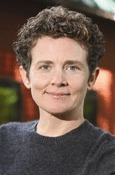Not long ago, I asked a high school creative writing class, How many of you want to be writers when you grow up? Perhaps half of the kids put up their hands and then, as if any movement of an adolescent limb automatically triggers more, they began flailing around, giggling and smacking each other.
"Settle down," the teacher said severely. "You should be taking notes for our discussion of Ms. Braestrup’s visit." Dutifully, the kids picked up their pencils and gazed at me expectantly.
"There are two things you need to know about being a writer," I said.
"The first is that writers write. Writers are so compelled to write that they’ll keep scribbling away about nothing at all, just to watch the words line up across the page. It has nothing to do with talent. There are bad writers and good writers, but writing itself could probably be called a mental health issue. Eventually there will be a cure, but in the meantime, if you’re a writer, you’ll know it because you can’t not write."
" The second thing is that, generally speaking, when we first start out, most writers don’t have a whole lot to write about. That doesn’t stop us, mind you. We write poems about the guy we have a crush on, his snow-white teeth, his sky-blue eyes . . . there are writers in their 40s and 50s who still write this way, but I don’t want you to be that kind of writer. So my advice is: Get a real job. You’ll need the money, since writing doesn’t pay well, and you’ll need to be useful. I recommend plumbing." The kids’ faces went blank. "Plumbing?" squeaked the teacher.
"Plumbing," I said, and the kids wrote the word in their notebooks.
"Plumbing pays pretty well, and it’s virtually recession-proof." I pointed out. "If someone’s toilet is broken, getting it repaired is not a luxury. And the job can’t be outsourced to some guy in Bangladesh, either, so the plumber’s job is about as secure as any job in the 21st century can be. Plus, a plumber spends time in people’s kitchens and bathrooms. There are stories ripening in those areas of your average house, stories in the manifold objects a good writer and plumber might pull out of the flush."
"What kind of objects?" a boy asked, while his teacher ahem-ed nervously and glanced at her watch.
"Just become a plumber," I said. "Trust me. I am not a plumber. I’m a law enforcement chaplain. It is my vocation, my work in life, a job I love. As a chaplain, I respond to immediate need, the terrible human suffering of the abruptly, unexpectedly bereaved. I am called to be present in love, to hold the body of the new widow, the sudden orphan, the father whose son drove away from the house in a teenaged rage and now will never come home."
So when people ask, "what do you do?" I don’t answer, "I am a writer." Never mind that writing is, at this point, my primary source of income; never mind that I will happily spend hours scribbling nonsense down on paper just for the joy of watching the words form. Writing is fun, like eating creme brule or knitting with cashmere. It is as chaplain to the Maine Warden Service that I give useful service; this is the tangible task to which I have been called. On the other hand, I thought, as I drove home from the high school creative writing class, my job has also given me stories. A book’s worth of stories, in fact, set in the wild, raw beauty of Maine and populated by characters as wonderful and diverse as any writer could ask for.
There is another question, one I haven’t answered completely for myself. Might I someday be able to think of writing as a calling, a way of being loving and present? Might the pleasure I take in the work be a sign not that writing is self-indulgent, but that it is, in fact, real life too? Maybe next time I talk to teenage writers, I shall ask them this: How might writing the act itself, your words dancing so seductively across the page be a response to human suffering, to need, to injustice? Might your obsession with words be your calling, urgent and holy?
Kate Braestrup has written for Mademoiselle, Ms. and TV’s "Law and Order." Her latest book, Here If You Need Me, is about losing her first husband, a state trooper who was killed in a car accident; becoming a minister and the people she’s met as a chaplain. She lives in Maine.








